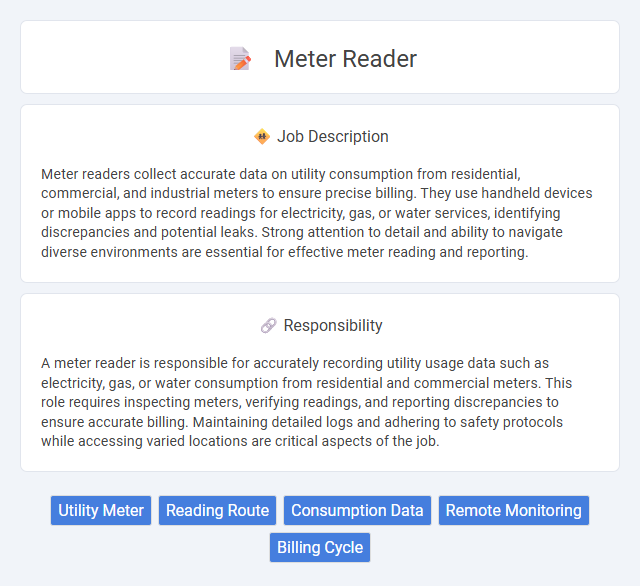
Meter readers collect accurate data on utility consumption from residential, commercial, and industrial meters to ensure precise billing. They use handheld devices or mobile apps to record readings for electricity, gas, or water services, identifying discrepancies and potential leaks. Strong attention to detail and ability to navigate diverse environments are essential for effective meter reading and reporting.
Meter reader jobs may be suitable for individuals who are physically fit and able to spend extended periods walking or climbing to access meters. People with good attention to detail and comfort working independently outdoors might have a higher probability of succeeding in this role. Those with mobility issues or who prefer predominantly indoor work may find the job less compatible with their conditions.
Qualification
Meter reader positions require a high school diploma or equivalent, with additional technical training preferred. Candidates must possess strong attention to detail and basic math skills to accurately record utility consumption data. Physical stamina and the ability to work outdoors in various weather conditions are essential for successful job performance.
Responsibility
A meter reader is responsible for accurately recording utility usage data such as electricity, gas, or water consumption from residential and commercial meters. This role requires inspecting meters, verifying readings, and reporting discrepancies to ensure accurate billing. Maintaining detailed logs and adhering to safety protocols while accessing varied locations are critical aspects of the job.
Benefit
Meter readers likely benefit from consistent employment opportunities due to the ongoing need for utility data collection. This role probably offers a degree of physical activity and outdoor work, which could appeal to individuals seeking a job away from typical office settings. Moreover, experienced meter readers might have access to stable wages and potential for overtime pay, enhancing their overall compensation package.
Challenge
Meter reader jobs often involve navigating challenging environments, including remote or difficult-to-access locations, which can test physical endurance and adaptability. The probability of encountering irregularities or faulty equipment increases the complexity of data collection, requiring attention to detail and problem-solving skills. Weather conditions and tight schedules may further complicate daily tasks, adding to the overall challenge of maintaining accuracy and efficiency in this role.
Career Advancement
Meter readers gain valuable experience in utility data collection and equipment operation, serving as a foundation for career growth. Skill development in digital meter technologies and data analysis opens pathways to roles such as meter technician, utility analyst, and field supervisor. Pursuing certifications in electrical systems or utility management further enhances promotion prospects within energy companies.
Key Terms
Utility Meter
Utility meter readers are responsible for accurately recording consumption data from water, gas, or electric meters to ensure proper billing and resource management. They must be proficient in using handheld electronic devices and understand meter mechanics to report discrepancies or malfunctions efficiently. Regular meter reading schedules and data verification processes help maintain utility service accuracy and customer satisfaction.
Reading Route
A meter reader follows a designated reading route to accurately record water, gas, or electricity consumption from residential and commercial meters. Efficient route management minimizes travel time and maximizes the number of meters read daily, ensuring timely and precise data collection. Advanced handheld devices and GPS technology optimize route navigation and data accuracy for utility companies.
Consumption Data
Meter readers play a critical role in accurately collecting consumption data from residential, commercial, and industrial utility meters. Their precise readings enable utility companies to generate accurate billing, monitor energy usage trends, and detect potential issues such as leaks or meter malfunctions. Advanced digital meters and mobile data collection tools have enhanced the efficiency and accuracy of consumption data gathering in the meter reader profession.
Remote Monitoring
Meter readers specializing in remote monitoring use advanced digital technologies to collect accurate utility consumption data without physical site visits. Their role involves managing smart meters, ensuring data integrity, and analyzing consumption patterns to detect anomalies or inefficiencies. Remote monitoring enhances efficiency, reduces labor costs, and supports real-time energy management for utility providers.
Billing Cycle
Meter readers play a crucial role in the billing cycle by accurately collecting data on water, gas, or electricity usage from residential and commercial meters. This information is essential for utility companies to generate precise monthly or bi-monthly bills, ensuring customers are charged based on actual consumption rather than estimated usage. Efficient meter reading minimizes billing errors, supports timely invoice issuance, and enhances overall revenue management for utility providers.
 kuljobs.com
kuljobs.com